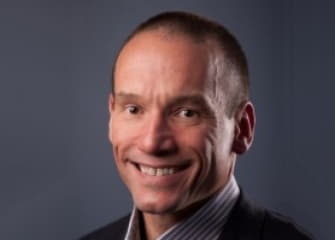
Andy Jones
Click here for Part II & Part III
Andy Jones has been a whiff of fresh air, and a bundle of energy, at Maryland Venture Fund since taking its helm as managing director in late 2015. In a little over a year, he is near closing a new fund, is taking the Baltimore-centric fund to other hubs and harnessing the rich IP residing at Johns Hopkins.
“As you know this great state we all live in, there is a lot of deal activity all over the place. So I wanted to make sure when I rebuilt the team that we had people and presence in particularly the important deal geographies,” Jones told citybizlist’s Edwin Warfield in an interview.

Jones earned bachelors and masters degrees in electrical engineering from Cornell University and a Masters of Business Administration degree with specialization in finance from the University of Chicago’s Booth School of Business. He began his career working in the research labs of Motorola and later earned his spurs in venture investing at Grotech and Boulder Ventures. Jones also ran his own firm, High Street, with swift success.
Maryland Venture Fund has over $100 million under its management and has invested in over 150 technology companies in Maryland.
EDWIN WARFIELD: I am Edwin Warfield. I am honored today to interview Andy Jones, the managing director of the Maryland Venture Fund.
Let’s get started with High Street Partners.
ANDY JONES: I hooked up with a friend of mine who had created a little business. His name is Larry Harding. We hatched this plan in 2009. We thought it could be a really big business but we were going to need some venture capital to grow it. So in (20)09 we put the plan together and January 2, 2010 we went out and we went to the market.
I talked to a handful of venture capital firms that I knew that I thought would have an interest in this SaaS software business with a services component underneath. It was a business where if you are a company in the U.S. and you hired your first employee overseas in the U.K. or Hong Kong. You needed to do all these things to support the employee, the payroll, the compliance filings in the country, the local accounting, the vendor payments and so what the market was missing at that time you could get multiple vendors, stitch them together in a country and they could support you. We did it all end-to-end and nobody had a SaaS software product that could hook into their corporate ERP system to do it.
So that was the business idea and we went out to market to raise capital to build on that vision, to build the software product and to expand sales and marketing to grow the business. We were very successful, we got a good response in the market, we ended up choosing Sigma Partners in Boston and Menlo Park, at the time they had an office, and Baird capital in Chicago and London. The reason we chose those two investors versus some of the other folks that wanted to invest in us was we felt Baird was very good in terms of their knowledge of the ecosystem around us, the competitive landscape, the HR software vendors, the payroll companies, people that were tangentially competing with us and then we thought Sigma was very good in terms of technical SaaS software companies. We thought that was a marriage made in heaven and we took their capital and sold them a piece of the business and we grew the business and it went very well. It went so well in fact that every time we would go to raise another round of capital to expand the business, Sigma and Baird wanted it for themselves because they wanted to keep increasing their ownership in our business and they were great partners. They really helped us build our business. They were more than just capital, they helped us with recruiting, they helped us with strategy, partnerships, I mean all through the evolution.
Fast forward to 2014, one of our competitors in Europe who I had hired a lot of our employees out of as we built High Street was on the auction block for sale and the investment banker that was representing the owner of that business, it is about $40 million business. I got my nose under the tent and started talking to the firms that were bidding on that asset. These were big private equity firms and I said my pitch. I said if I had a big checkbook out of a private equity fund I would buy this asset, we had built the leading business in North America and South America, and there were two competitors in Asia and if you put all those together you had a $200 to $250 million business with huge profit margins, you could take that business public.
The PE guys really liked that story, it was an auction process for this company called Nare and HT Capital won the bid at the end of the day. HT manages about $8 billion, they are out of London. They bought the asset and right after they bought the asset they were in our offices in Maryland here with an offer to buy our business. Now, of course, it (the bid) was too low and we rejected it and did the dance but we knew they would be back and a quarter later they came back and offered to buy our business for $100 million. That was a great outcome. We consummated that deal. Our investors Sigma and Baird made on a blended basis three times their money and when we sold that business we had 220 employees and the employees split up the rest. So that was a great outcome and that was really fun for me in my career building something from nothing. I had been on the investment side finding great entrepreneurs but it was fun to do the other side and build an operating business. After we sold that, I had to work for the private equity firm for three months, helping them integrate the business and then I was free to do what I wanted to do next.
EDWIN WARFIELD: How did your association with Maryland Venture Fund start?
ANDY JONES: I was actually put on the board of the Maryland venture fund authority back in 2011 or 2012 and they put me on the board when I was building High Street because of my venture capital experience with Growtech and as we built out Boulder.
In around 2015 there was a movement underfoot to spin the entity, the Maryland Venture Fund, out of the state of Maryland and they were looking at where they were going to put the thing and they ended up settling on putting it with TEDCO. TEDCO is an entity, it is called a public corporation, it's not directly part of the state. It's kind of one step removed and the reason they decided to put the Maryland Venture Fund with TEDCO is TEDCO does all the seed investing every year. They invest in life science companies, they have a university fund, they have a cyber fund, they have a tech fund and the theory, which we are executing on today, is if the Maryland Venture Fund was with that well, maybe, some of those seed investments will feed into the Maryland venture fund and oh, by the way, if we rebuild and turn around this Maryland Venture Fund maybe some of those best practices that we institute with that will be helpful to the TEDCO seed investment programs, too. There are some real synergies with Maryland Venture Fund being with TEDCO, and it all makes sense. It is up to us to execute on.
Connect with Andy on LinkedIn
Sponsored by:
Founded in 1993, WMS Partners is the only independent multi-family office in the Baltimore area that isn’t associated with a brokerage firm, bank or trust company. Our team of approximately 50 professionals and 14 owners spanning three generations assists in the direction of our client’s financial goals and objectives and oversees in excess of $3 billion in assets.
As our client’s advocate and central point for their financial affairs, we work pro-actively with service providers, including accountants, attorneys, consultants, insurance professionals and philanthropic advisors. We are large enough that we provide exposure to many unique ideas and strategies in the investment, estate, tax, financial advisory and risk management arena; but small enough to provide discreet, pro-active individualized guidance.


Edwin Warfield, CEO of citybizlist, conducts the CEO Interviews.
If you're interested in reaching CEOs, please contact edwin.warfield@citybuzz.co
Connect on LinkedIn
















